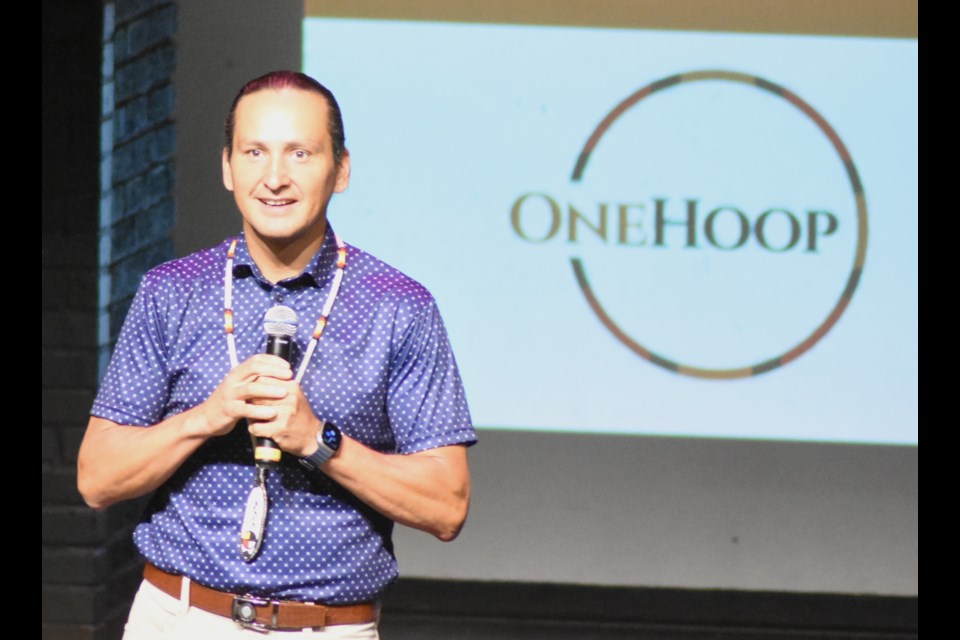MOOSE JAW — Canadians today may not have created Indian residential schools, the Indian Act or the ’60s Scoop, but they inherited that history and have a responsibility to do something about it, a retired chief says.
Cadmus Delorme, the former leader of the Cowessess First Nation and current CEO/founder of economic reconciliation-based company OneHoop Advisory Services, was the keynote speaker during Prairie South School Division’s staff-focused back-to-school event at A.E. Peacock Collegiate on Aug. 29.
The theme of the businessman’s presentation was truth and reconciliation, where he pointed out that “truth” comes from the brain and “reconciliation” comes from the heart.
“… I am going to help us rewire our brain to understand truth,” Delorme said, noting that teachers are collectively the “driver of hope” for educating the next generation about this issue.
“Education got us into this moment, and education will get us out of this moment,” he remarked.
Throughout his presentation, Delorme, 42, told stories from his life to better communicate aspects of truth and reconciliation and discussed how “oppressive (government) policies” snuffed out Aboriginal People’s worldviews.
Delorme’s parents attended residential schools, although they never spoke about their experiences when he was a child. It was only when he was in university that he learned about residential schools, their time there, and the sacrifices they made for him.
“At our family table, there was a lot of humour. We were love rich, but not financially rich,” he said.
Delorme noted that his father could have left him to stumble around on the reserve without direction, but he wanted his son “to be a dreamer” and have a better life. Due to his father’s encouragement and the university education he acquired, the former chief says he feels comfortable being in any room with anyone, anywhere.
The businessman pointed out that there are two worldviews in Canada today. One is the Canadian perspective, which is “beautiful” since everyone thrives on it. The second is the indigenous worldview, which existed before Europeans arrived and continues to exist today.
He noted that he had a strong Aboriginal worldview after graduating from university with his bachelor’s, while he acquired a Canadian perspective after acquiring his master’s degree.
These perspectives helped him realize that there must be two types of relationships for reconciliation to become a reality. One is “quasi-jurisdictional,” where areas like the Education Act must be reopened to include indigenous worldviews, while the second is economics, where Aboriginal people must be given job opportunities.
Delorme used four historical examples to show how people should rewire their brains after learning the facts — the truth — about situations.
Firstly, he read comments that the prime minister made in 1879 about separating First Nation kids from their parents and putting them in schools. The businessman noted that some people today “get triggered” because of what happened generations ago.
Secondly, he said Winnipeg should search its landfill for bodies of missing indigenous women since it’s a matter of honour and dignity.
Thirdly, he said the Oka Crisis of 1990 wouldn’t have happened if the Quebec town had first consulted with the nearby reserve about expanding the community’s golf course.
Fourthly, the former chief said the discovery of unmarked graves on the Cowessess reserve in 2021 helped change attitudes among Canadians.
Delorme pointed out that Canadians have received varying levels of education about residential schools and Aboriginal Peoples over the decades.
Baby boomers learned about First Nation people through unrealistic Hollywood movies, while certain schools taught that residential schools were “saving the Indian.”
Gen Xers were taught that Aboriginal people should “get over” their experiences, stop acting special, move off the reserve, give up their rights and become Canadian.
Gen Y/Millennials were taught that First Nation people came from Asia and, through the Indian Act, agreed to give up their land and accept residential schools.
Today, Gen Zed are given cultural sensitivity training, Native Studies classes, indigenous studies and more comprehensive education.
“We (adults) are the students right now in truth and reconciliation. Our kids are our teachers,” Delorme said. “The most important table to talk reconciliation … is the kitchen table your kids go to.”
Reconciliation is also about “decolonization,” which does not mean First Nation people want to move back to the 1880s, he said. Instead, it means Aboriginal People want to maintain their traditions in 2024 and live in both worldviews.
The relationship that Canadians and indigenous people should have — based on the treaties — is like two canoes travelling the river together sharing and respecting those ideologies, Delorme continued. However, the Indian Act and residential schools poisoned people’s minds, slowing down the Aboriginal canoe.
“Today, in 2024, we are just trying to catch up. That’s reconciliation … . Indigenous people don’t want to slow down Canada. We don’t want to take a different river,” he said, adding the 94 Calls to Action can help transform that relationship.




